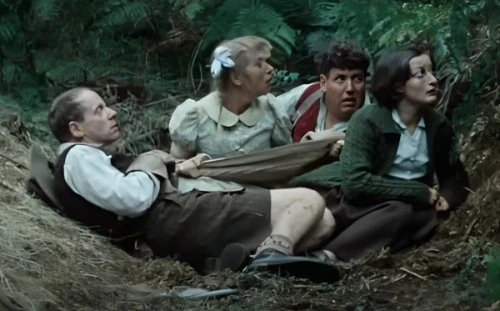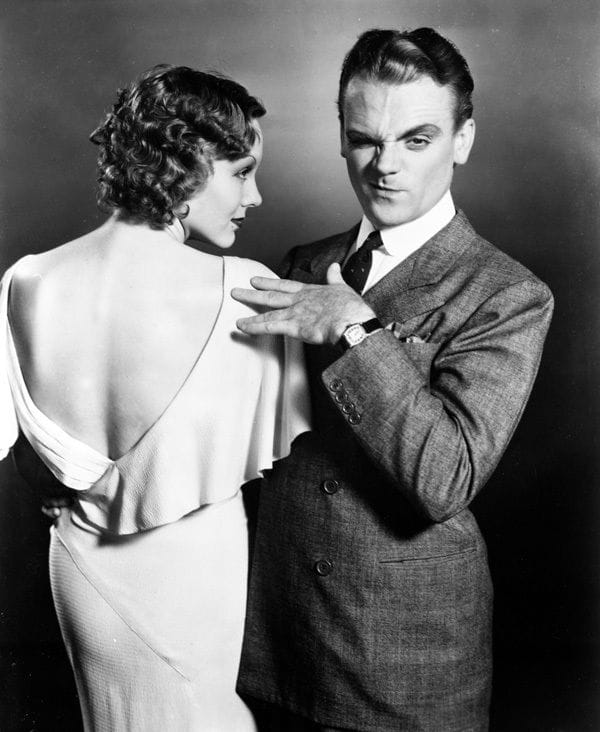“Into my heart an air that kills
From yon far country blows:
What are those blue remembered hills,
What spires, what farms are those? That is the land of lost content,
I see it shining plain,
The happy highways where I went
And cannot come again.”Blue Remembered Hills (Brian Gibson, 1979)
Jun
16
Youth Day

The children playing in the Forest of Dean. From left to right: Raymond (John Bird), Angela (Helen Mirren), Willie (Colin Welland), and Audrey (Janine Duvitski). DP: Nat Crosby.
A [favourite] child character for Youth Day (ZA)
– narrator, after A.E. Housman's A Shropshire Lad
A group of children plays. It's sunny and lovely in the Forest of Dean, a day to remember for as long as one lives. The war, the second one, is one of the adults' plays and far away from the children's much simpler life. It seeps through, though. You may run around, imagining being a fighter bomber, putt-putt-putting while you do so. And your uncle, your uncle!, is a parachutist! And maybe your dad is missing and your mum is doing something that involves bed sheets, and the other kids are mean about that. That too. That too is the cruelty of blue remembered hills.
La maudite galette [Dirty Money] (Denys Arcand, 1972)
Jun
16

Berthe (Luce Guilbeault) points a rifle offscreen. Next to her a perpetual wall calendar from Desjardins with the date. It's June 16. DP: Alain Dostie.
“That gets it. That little touch of lavender. Am I gonna stink pretty.”Picture Snatcher (Lloyd Bacon, 1933)
Jun
16

Patricia Nolan (Patricia Ellis) and Danny Kean (James Cagney). DP: Sol Polito.
– Danny Kean
“Janitor of lunacy
Paralyze my infancy
Petrify the empty cradle
Bring hope to them and me Janitor of tyranny
Testify my vanity
Mortalize my memory
Deceive the devil's deed”La cicatrice intérieure [The Inner Scar] (Philippe Garrel, 1972)
Jun
15
Ice Cube – 1969

Nico and Ari. DP: Michel Fournier.
A musician in a film role for O'Shea Jackson Sr. aka Ice Cube's birthday (1969).
– Nico, Janitor of Lunacy (Desertshore, 1970)
Accompanied and inspired by Nico's Desertshore, the musician tracks the barren landscapes of Iceland, Egypt's Sinai, and Death Valley with her son Christian (Ari) in tow.
“Instead of leaving this morning, I'm still here. Among friends.”Strategia del ragno [The Spider's Stratagem] (Bernardo Bertolucci, 1970)
Jun
15
Sat

A clock face. It's 9:54 on Saturday June 15. DPs: Franco Di Giacomo & Vittorio Storaro.
The two-page story this film is based on – Jorge Luis Borges' Tema del traidor y del héroe [Theme of the Traitor and Hero] (1944) – takes place on January 3 and August 2.
– Athos Magnani
“That’s how I will probably die, left like a poor old rag on the battlefield. When you know this is going to happen to you, your body suddenly becomes something terribly precious to you. This flesh, soft and warm is yours; a personal belonging not to be discarded like an awful piece of meat. You find yourself thinking about this, realizing what a wonderful thing your body is, and what an awful and wrong thing it is to maltreat it.”The Diary of an Unknown Soldier (Peter Watkins, 1959)
Jun
14
Army Day

That glance. Any soldier at any time. DP: Peter Watkins.
A [favourite] soldier in film for Army Day (USA). I can not in all seriousness link to any official website in fear of throwing up, so please follow along here
Watkins takes the anonymous slaughter of the masses on the battlefield inside, into the body and mind of a young soldier.
– I saw you the other morning, eating frites. – I like frites.Bob le flambeur [Bob the Gambler] (Jean-Pierre Melville, 1956)
Jun
13
frites

Anne (Isabelle Corey), a cute blonde with a beret, eats a fry (French, obviously) while giving us a side glance. It's all very proto-Vague. DP: Henri Decaë.
“I'd even lose at hopscotch these days.”Bob le flambeur [Bob the Gambler] (Jean-Pierre Melville, 1956)
Jun
13
Friday

Bob (Roger Duchesne) at the tables, gambling. DP: Henri Decaë.
An unlucky character on Friday the 13th
– Bob Montagné
Bob gambles, and always wins. But then he starts losing. And not just games.
Black Friday (Arthur Lubin, 1940)
Jun
13

DP: Elwood Bredell.
Wyszedł w jasny, pogodny dzień [He Left on a Bright, Sunny Day] (Krzysztof Wojciechowski, 1972)
Jun
13

Old people exchanging food and memories outdoors. DPs: Witold Stok & Ryszard Wróblewski.